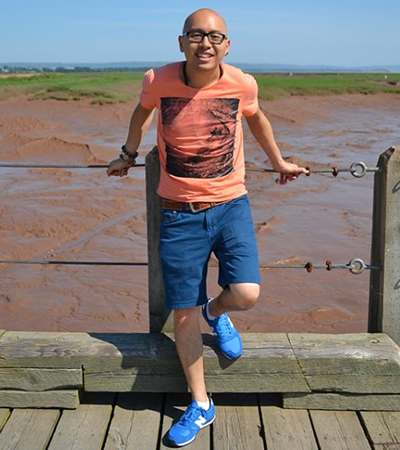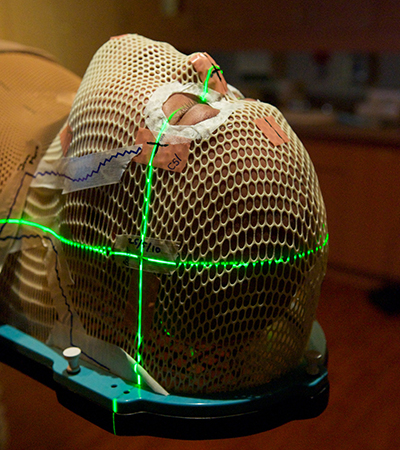
Brandon says cancer changed his perspective on life. He often volunteers his time doing motivational speaking and fundraising for a local cancer foundation in his hometown of Ottawa. (Photo: Brandon Fong)
When Brandon Fong began experiencing blurry vision he never expected it would land him in the hospital.
"I thought it was just time for new glasses and I saw an optometrist, but nothing seemed to work, and eventually I started seeing double," Brandon recalls. "It got so bad there were times I could only operate by closing one eye."
One night, while out with a friend, Brandon's vision problem hit its peak when it made him vomit. His friend urged him to go to a hospital.
After undergoing several tests, Brandon learned he had intracranial germinoma, a brain cancer commonly found in children and young adults. He was 26 years-old.
"It was a shock," Brandon says. "I had my whole life ahead of me - I was fairly fresh out of university, I was living downtown, had recently started a new job – when you're that young you just don't expect to hear the word cancer."
Brandon became a patient at the Princess Margaret Cancer Centre and his treatment plan involved radiation to his brain and spine five days a week for just over a month.
"Going through treatment was not only stressful for me, but it also put stress on my family and friends," Brandon says.
"It's hard to process your emotions and being that young I just felt I was being robbed of the chance to live life."

Brandon undergoing radiation treatment for intracranial germinoma, a brain cancer most commonly found in children and young adults. (Photo: Brandon Fong)
Finding support in AYA
While going through treatment, Brandon found it difficult to reintegrate into society and understand his new normal. He found support through the Princess Margaret's
Adolescent and Young Adult (AYA) Oncology program.
The AYA program at the Princess Margaret offers resources, coping support, and referrals to other specialized services for individuals who are 39 years of age and younger.
"When someone young is diagnosed with cancer it is devastating for them," says Laura Mitchell, Clinical Nurse Specialist with the AYA program. "Not only is it difficult on their physical health, but also on their careers and academic goals, peer relationships, and potentially the ability to have a family.
Adolescent and Young Adult (AYA) Cancer Awareness Week is from May 9 to May 13, 2016. Healthcare professionals, staff and volunteers at the Princess Margaret are invited to attend the 2016 AYA Lectureship – Considerations and Benefits of Exercise for AYA Cancer Survivors Featuring Dr. Daniel Santa Mina on May 9 at 12:30 in the Bob Bell Auditorium at Princess Margaret (room 6-604).
The winners of The Michael Kamin Hart Award for Excellence in Adolescent and Young Adult (AYA) Oncology Care will be announced following the lecture.
"The program has been established to normalize these concerns and to facilitate approaches for AYA to still accomplish these goals- even if it means exploring alternative ways of doing so."
Approximately 1,500 AYA are diagnosed with cancer each year at the Princess Margaret and these individuals are known to have unique psychosocial and clinical care needs that require additional support. These needs can often be related to fertility risks and preservation options, sexuality, school and work transitions, social relationships, nutrition, and exercise.
"AYA creates a sense of community," Brandon says. "It's monumental for a young adult to have this kind of program because it ends the feeling of isolation. I didn't feel crazy anymore because I found people who could relate to what I was feeling."
Brandon says the program really helped with social integration and questions of self-worth.
"Acceptance of my situation was difficult at first. You don't feel the same or look the same and I would think, 'will someone accept me as I am?' AYA provides an environment to address these kinds of concerns that are also important during the cancer journey."
Getting a second chance
Brandon has been in remission now for five years and says that cancer has given him a new outlook on life.
He has repaired the once broken relationship he had with his father and does motivational speaking to bring awareness to survivorship.
"Cancer was the worst thing that's happened to me, but I've also learned to see it as the best thing that's happened," Brandon says.
"It has been a catalyst for change in my life – I treat myself better, I don't sweat the small stuff like I used to, and I'm more present in the moment."
